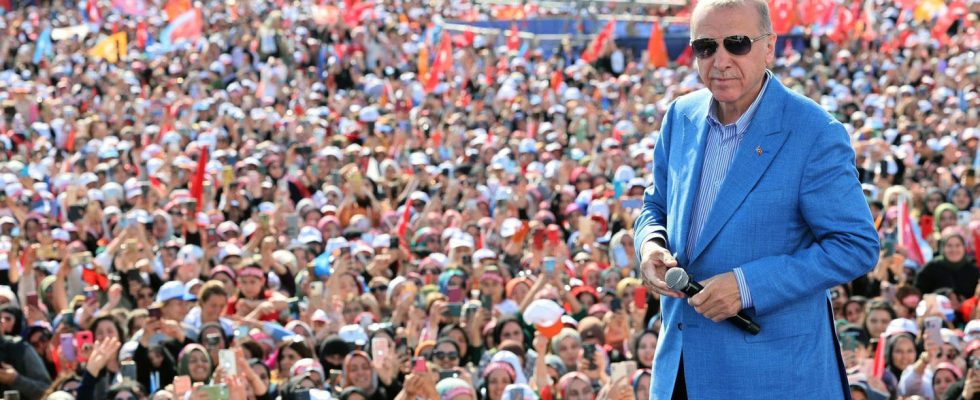Recep Tayyip Erdogan became Turkey’s political leader in 2003. Since then, his political opponents have denounced an authoritarian and Islamist drift. Erdogan will try on May 14, 2023 to be elected president for the third time.
Recep Tayyip Erdogan is under threat in an election in Turkey for the first time since 2003. The president faces strong unpopularity in his country following his government’s handling of the country’s powerful earthquake in February 2023 and because of a very delicate economic situation. The elections scheduled for May 14 could therefore mark a turning point for Turkey.
The new democratic impetus promised by the candidate Erdogan in 2003 now seems a long way off for part of the country, in particular the big cities which are not acquired by him. Since July 2016 and a coup, Erdogan has made an authoritarian turn in his way of governing. Many political opponents were imprisoned and a purge was carried out in all state departments.
A third contested presidential candidacy
Erdogan was far from imagining that the presidential election would be so delicate for him. In 2014 and 2018, he was easily elected in the first round. His candidacy is controversial because the Turkish constitution limits the number of presidential terms possible to two. His party explains that the 2017 constitutional revision reset the mandate counter to zero.
The Politico polling institute gives its main opponent, Kemal Kiliçdaroglu, as the winner in the first and second rounds thanks to a method combining several results of opinion polls. Erdogan relies on the image of the providential rebuilder, following the significant damage caused by the earthquake that occurred in February 2023, to win this third presidential election in a row.
Who is Recep Tayyip Erdogan? His biography
Recep Tayyip Erdogan was born on February 26, 1954 in Rize, a city located in northeastern Turkey, near the Black Sea. From his adolescence, he became known as a fervent defender of political Islam. Besides playing in a professional football club, Erdogan is studying at Marmara University. It was at this time that he met Necmettin Erbakan, a historic Islamist leader, and began to campaign within the movements led by Erbakan, despite the ban on religious political parties.
In 1994, Erdogan was elected mayor of Istanbul under the label of the Prosperity Party. This unprecedented victory of an Islamist candidate for the post of mayor provokes hostile reactions from secular circles. However, Erdogan is proving to be a competent and prudent manager. He abandoned the controversial plan to build a mosque in the city’s central square, but managed to ban the sale of alcohol in municipal cafes. In April 1998, he was charged with inciting religious hatred for reciting a poem in which mosques were compared to barracks, minarets to bayonets and believers to an army. Sentenced to ten months in prison, he resigned from his post as mayor.
Key dates:
- March 27, 1994: He was elected mayor of Istanbul under the label of the Prosperity Party. However, he had to give up his post four years later because of his imprisonment for having recited a nationalist poem during a meeting.
- March 14, 2003: Recep Tayyip Erdogan is officially appointed Prime Minister of Turkey. He retained this post until 2014 when the Turkish Constitution was amended. He then becomes President of the Republic but he combines powers because the role of Prime Minister disappears.
- July 15, 2016: A coup attempt is carried out by part of the army to overthrow Erdogan’s government. The putschists fail and Erdogan’s response is scathing: more than 18,000 people working for the public sector are imprisoned.
After an early release after four months, Recep Tayyip Erdogan resumes his political activities. When Necmettin Erbakan’s Prosperity Party was banned in 2001, Erdogan broke with it and participated in the creation of the Justice and Development Party (AKP). This new party won the legislative elections of November 2002. However, Erdogan could not be elected deputy nor become president of the Council, that is to say Prime Minister, because of his condemnation in 1998. A constitutional amendment adopted in December 2002 makes it possible to cancel his ineligibility. On March 9, 2003, Recep Tayyip Erdogan won a by-election. A few days later, President Ahmet Necdet Sezer entrusted him with the task of forming the government. Erdogan took office as Prime Minister on May 14, 2003. He has been in power since that date but became President of the Republic in 2014.
